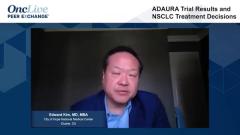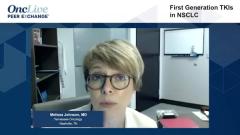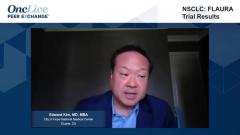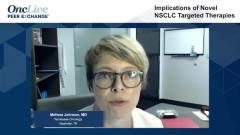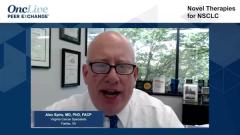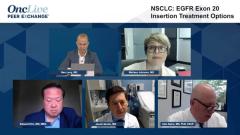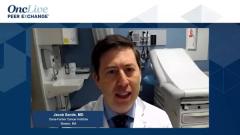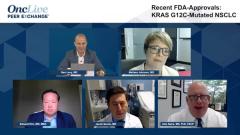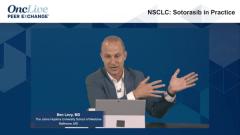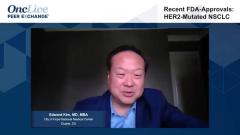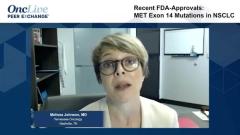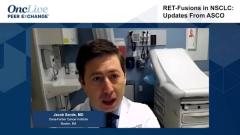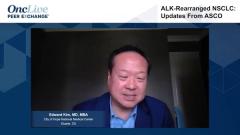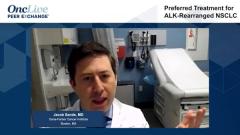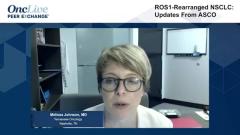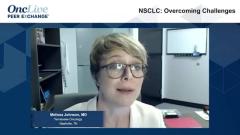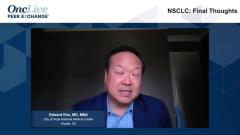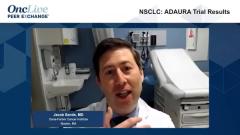
First Generation TKIs in NSCLC
Melissa Johnson, MD, provides an overview of other first generation TKIs for the treatment of non–small cell lung cancer (NSCLC) in the adjuvant setting.
Episodes in this series

Ben Levy, MD: Let me move on to some of the other data we saw with first-generation TKI [tyrosine kinase inhibitor] at ASCO [American Society of Clinical Oncology Annual Meeting] this year in the adjuvant setting, which is making things confusing on how to interpret FLAURA. Melissa, we had 2 studies, 1 looking at adjuvant gefitinib, the other looking at either neoadjuvant or adjuvant erlotinib in early stage lung cancer, EGFR mutated. Do you want to walk us through data sets at ASCO? They were oral presentations recently.
Melissa Johnson, MD: You’re right. We need to move beyond ADAURA a year ago and try to use these data to help us move forward. The IMPACT study was a Japanese study, about 230 patients who were enrolled between 2011 and 2015. They were all EGFR 19 and 21. They were stage II and stage III patients, and they received gefitinib or cisplatin at 80 mg/m2 and vinorelbine 25 mg/m2, on day 1 and day 8 in the adjuvant setting. The patients received gefitinib for 2 years in this trial. The point Ben made about the arbitrariness of how long we’re doing this adjuvant TKI.
Now we have the disease-free survival data from this trial. The median follow-up time was 71 months, so they’ve been following these patients for a while. Disease-free survival was in favor of gefitinib— 36 months vs 25 months median. But between years 3 and 5 we saw the Kaplan-Meier curve come back together again, and the hazard ratio ultimately was 0.92, suggesting that there wasn’t much of a benefit for those patients that got gefitinib over chemotherapy. Maybe a signal in patients who are more than 70, which makes sense given what we’ve already said.
That’s interesting. As I take that away, I conclude from that abstract that TKIs and chemotherapy both have benefit, and gefitinib doesn’t have more than chemotherapy. OK, we’re not talking about adjuvant gefitinib in the United States anymore—in the world, actually. We’re talking about osimertinib, which we know to be a more potent drug given the FLAURA data. We can extrapolate that there’s value from both. We can’t conclude that patients need to get chemotherapy according to the ADAURA data as a result of IMPACT.
The second study, Ben, was a Chinese study. It was 17 institutions, multicenter, called Emerging-CTONG 1103. It was a cooperative group–sponsored effort. There were 300 patients screened and 72 treated—a small study when you get down to the numbers. But all patients had EGFR-positive disease but N2 stage IIIA. These are patients who were at high risk of recurrence, and they were randomized to get erlotinib for 42 days followed by resection, and then a year of erlotinib to follow or gemcitabine- cisplatin for 2 cycles and then surgery, and then 2 more cycles of gemcitabine- cisplatin.
The bottom line is that although the median was higher for the patients who were in the TKI group, there was no statistical difference in outcomes, once again suggesting to me that a TKI is a powerful drug in the adjuvant setting and perhaps in the neoadjuvant setting as well. We should recognize that chemotherapy had incremental benefit, but this suggests to me that the TKI is the more powerful drug.
Ben Levy, MD: Nice summary, Melissa. Does this take away from ADAURA in any way? Head-to-head with chemotherapy, there was no benefit. Or does it, as you said, reinforce that you need chemotherapy? Is osimertinib a better drug than these first-generation TKIs in the adjuvant setting?
Melissa Johnson, MD: The answer is no. It supports the conclusion that you might not need chemotherapy in every case. Because the 2 are equivalent, I see them as both adding benefit, not 1 more than the other. Can you get all the benefit you need from a TKI like osimertinib? Maybe.
Ben Levy, MD: Any other parting shots on adjuvant TKI in EGFR-resected space?
Melissa Johnson, MD: The last study that I wanted to mention was just the initial experience. It was an interim analysis of neoadjuvant osimertinib. It was a Chinese study. The primary end point was objective response rate. Objective response rate was 73% in a small group of patients. What I found interesting was that of the patients who had N2 disease going into their surgery, osimertinib for 6 weeks prior to resection resulted in 43% being downstaged to N0. This suggests that even in the neoadjuvant space, these TKIs are doing things that we can’t take for granted that chemotherapy will do. There’s a large AstraZeneca effort that will evaluate this, so stay tuned for more. The TKIs have moved into the early stage setting for good.
Ben Levy, MD: For the good of the patient as well. This is where we’re heading in the field, not only with targeted therapies but specifically with immunotherapies in the neoadjuvant and adjuvant space.
TRANSCRIPTS EDITED FOR CLARITY


